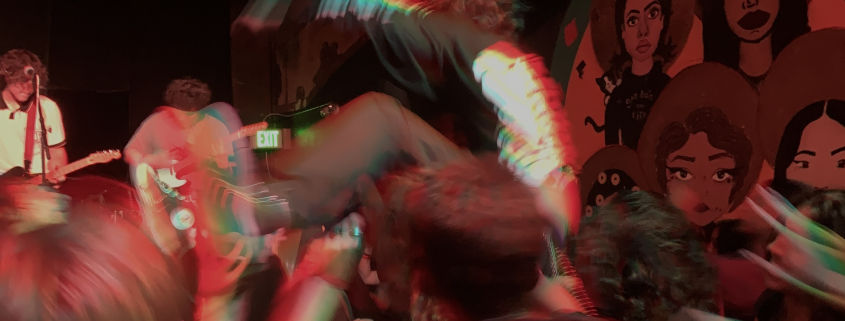Changing the narrative for rock bands

A cacophony of ruptured noise transforms into a beautiful ballad, infiltrating the speakers and awakening a crowd lost in the midst of thundering music. As the booming beat of the drums provides a zealous rhythm for the bass and guitar, the vocalist hypnotizes the audience with their compelling lyrics, amplifying euphoric experiences throughout their set. These eccentric feelings, tied to everlasting memories are all shaped by the eminent rock scene.
Oftentimes, individuals might associate rock with popular bands such as Led Zeppelin or Metallica, all of whom are incredibly well known today. While these artists have come to make a name for themselves, the community falls short of representing people of color — notably Latine people — who have yet to make another breakthrough within the music industry. Although Latine rock had its peak in the ‘80s and ‘90s, this wave of interest could allow for resurfacing once again — with a new purpose.
Bands such as Archer Oh, Mexican Slum Rats and The High Curbs are all creating their own legacies among the scene, paving the way for people of color to change the narrative of how rock and surf punk is perceived. These bands are giving the opportunity to realize that their listeners’ favorite musicians are from similar backgrounds, knowing they are seen and recognized in this safe and inclusive environment.
Archer Oh, for example, is taking the initiative of incorporating the exuberant sounds of a trumpet and harmonica to compliment their already complete ensemble. Their new album “Gradients” is a hauntingly stunning entity that explores the infinite possibilities of music, magnifying the stories of Hispanic origins. Specifically, the song “The Western Surf” is a must-listen, providing a semblance of mariachi music infused with lyrics that evoke an impassioned, indelible tone that will leave listeners wanting more.
The Mexican Slum Rats, who just recently released a new single “HIVEMIND,” are masters at composing songs one can feel to their core, balancing tranquility with chaos — a perfect mixture that is only heightened by their expressive instrumentals. Lead vocalist Kevin Villalba has an unforgettable and profound pitch that lingers to correctly portray the sense of vulnerability people often attempt to conceal, humanizing their music and creating an outlet for others to turn to. Accompanying Villalba’s vehement displays are the distinct sounds of a strumming guitar, making for a complete and ideal performance.
Members of The High Curbs Eduardo Moreno, Alberto Alvarenga, Aaron Korbe and Kenny Huerta all expressed how going from small backyard shows to now preparing for their west coast tour was no simple feat. Without much experience in songwriting, they took the time and effort to teach themselves how to illustrate emotions in the form of melodies. Persisting through such obstacles, refusing to let anything hinder their journey toward producing memorable pieces, sets them apart from the masses. Their unyielding determination and willingness to make a name for themselves has brought them such well-deserved success.
Their songs “Want,” “Always on My Mind” and their newest release, “I’d Run Away With You” have all become fan favorites with more than three million streams on Spotify. Echoes of intense and authentic emotions can be heard from each track they released, ranging from heartache to sonorous and piercing roars of rhapsody. The band allows for every unforgiving beat of the drum, reverb of a guitar and strum of the bass to be acknowledged, penetrating the barrier of exposed identity confronted with rock. Anyone listening to The High Curbs is reminded that they are not alone, regardless of whatever emotional or physical toll they might be going through.
Having built a foundation of unwavering acceptance within their audience, more people are invited to take a peek inside this setting of camaraderie and respect. Understanding that the band had to navigate these realms without much guidance has come to reinforce the importance of appreciating their delicately crafted art.
The difficulties of affording private music lessons and the privileges of being connected to the business stress how the music industry turns a blind eye to pure talent, served on a platter right before them.
The call to attention for more representation augments a relentless battle that encourages artists from a multitude of cultures to keep pushing back against the injustices that mainstream society tolerates. These performers have all weaved together extraordinary harmonies with their music, and it is about time to spotlight such brilliance.

